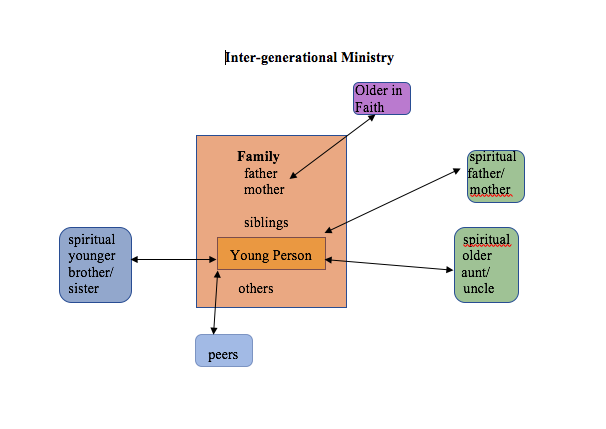If we want to love each other well as Christians, it’s time to get out of our relational comfort zone.
In Sydney we have some blind spots and they derive from our success.
Psalm 78 (along with so many others) speaks of the privilege and requirement of one generation telling the next of the marvellous deeds of the Lord. Those older have the communal responsibility to the next generation to remind them of the character and commands of God.
But when friends from England visit, a common observation is that our ministries are very different to theirs, and different in that we strata our gatherings by age: 8am is the retirees’ gathering, 10am is the family gathering and 7pm is for young people. “Back at home,” they say, “all our gatherings are for any age.”
I protest that maybe this is because of the English weather or, more helpfully, that “we are providing valuable, valued, focused and targeted ministry” by doing this. And a sharp response to me is that it’s fine for radio stations to differentiate by age, but “where do you fulfil Psalm 78?”
It’s a good question. This article is a call to both church leaders and all church members to think about how we structure our lives together to enable this generation-to-generation relating to be enhanced.
Across the generations
How do we fulfil Psalm 78? What does one generation telling the next look like?
From the outset let me state that I think there is much to commend homogeneous ministry – groups gathering with people in like situations – but it is not sufficient, and sometimes dangerous. So what do we do?
It seems to me that at the heart of it is thinking through our church relationships, enabling a Christian to see a path forward as they navigate the various stages of life, one marked out by those who have gone ahead of them.
The diagram below is my attempt to visualise what these pathway relationships look like from the position of a young person, taking into account the relationships they are already a part of.

A young person is not an isolated being. They exist in a family (nuclear: father, mother, siblings) and in a wider set of relationships that the family participates in.
Now consider the family. Parents, no matter how wise they may be, need help in raising children. There is no manual of how to raise children and the wisdom comes from having experienced raising children and making the mistakes in doing so. The people who have developed this wisdom are not generally the parents, but those who have already experienced it. So parents need older, wiser people to help them to raise this generation in knowing God.
A young person has a particular relationship with their parents, with all the relational, experiential and emotional complexities that go along with that relationship. While it is primarily the responsibility of parents to raise their children in the fear of the Lord, young people (and their parents) benefit greatly from having “uncles” and “aunts” in the faith, who may well say the same things as their parents, but who are listened to more intently. If nothing else, having these aunts and uncles reinforces that this is not just a weird way of living that our family has. Of course, this is even more important for a young person whose parents do not profess faith.
Faith aunts and uncles are so valuable, but a person’s identity and desires are significantly shaped by those just a little older or further along than them. So it is relationally beneficial for a young person to have an older “sibling”, who is not of their genetic family, to model the way forward and to be an anchor – or at least a sounding board – through the circumstances of life. This illuminates the immediate path for the young person to take.
Also, young people are shaped by their peer group. From just before teenage years, they tend to draw their identity not so much from family, but from peers. So having a Christian peer group is significant, and this is one of the areas we do quite well in church ministry.
So far, the descriptions of relationships have been focused on the young person we are considering and how these relationships will benefit them. To consider only these relationships is a breeding ground for self-centredness. We must, therefore, not ignore two further aspects of relationships that young people have. The first is with those younger than themselves. Just as they benefit from having older siblings in the faith, so too, no matter what age the young person is, they should think of how they can help younger people become more like Jesus. This is simple Christian thinking.
Second, each relationship described in the diagram has a two-way arrow. That is, every person needs to think and recognise that they may be a blessing to others with whom they have a relationship. The spiritual “father” can be greatly blessed by seeing the work of God in others. The questions and responses of young people to issues can challenge and teach older people.
It is not just relationships that are enhanced, though. The web of relationships described gives a pathway for people to follow as they progress through the different stages of life. At every stage there are people just a little further ahead showing the way, showing that persevering is both possible and beneficial and acting as mentors through the difficulties to be faced. Evidence abounds that people (often without intending to do so) stop serving Jesus at transition points of life. I wonder whether one reason is that there aren’t those just a little further ahead investing in helping these people to safely traverse these changes.
Why don’t we just do it?
If what I am proposing rings true, why aren’t we doing it? There are so many reasons, and the significance of each varies in different situations. But here are some that spring to mind.
Our churches have been reasonably successful in their age-stratified ministry. Early services are still viable because we are living off church attendance and faith from a generation ago. Praise God for this. Family services are still well populated, but the evidence shows that about one quarter of those attending came to faith through our good university ministries. That is, we have had loss of people migrating to family stages from our youth, but it has partly been hidden by good evangelism and ministry elsewhere.
Young people’s evening services have flourished, but in a diminishing number of churches. There is a buzz around being with people who are like you and a crowd attracts a crowd. So, while some evening services remain well attended, there is also a shocking number of churches in our own city that have now closed their evening services. I am arguing that one reason for not considering change is that we are doing quite well, but this will not last for much longer.
What we are doing satisfies our current members. Parents want their children looked after well. Young people love being with people like them. It is much harder and more costly for all involved to engage in inter-generational ministry. Our response is therefore to do what we have been doing, but just a little better each year. There is strong resistance to rocking the boat.
Our society has moved to the nuclear family and the outsourcing of tasks, and the ministry model we employ resonates with the way our society functions. We staff our ministries to maintain the status quo. It is usual that we ask our youth leaders to oversee the youth ministry, or if we have paid pastors we allocate the focused portfolio of youth ministry to them.
This division of labour makes it very difficult to structure inter-generational ministry; it requires a whole of church way of thinking. The impetus to create inter-generational ministry often comes from youth leaders, but they are the ones least able to execute it. They tend to not have deep relationships with older members, and sometimes have short tenure and so come and go in this ministry – leading them to be considered by others as not understanding the breadth of congregational life and issues, making it easier to dismiss their ideas.
What does it look like?
Recognising the forces that operate to resist change, what might we do? Here are some suggestions to get us started. They are intended to begin a conversation. I am sure conversations will provide even better input.
Inter-generational ministry is about promoting relationships and this involves long-term concerted effort, so beware the short circuit, quick-fix solution. One quick-fix solution is to undo the homogeneous age stratification by having everyone in the same place at the same time. Merely doing this has normally resulted in disaster. Every group has normal ways of engaging and to gather all together without helping to work out how we can build relationships actually harms the relationships – even within a homogeneous group, let alone the wider relationships.
If we are going to do this, it takes much hard work and time. We need to help every group think about how to use the time to best engage with others, and to know it will be initially be sub-optimal until we get it right or at least get used to it. Those preparing for this common time will need extra time to prepare themselves and others for the occasion.
Don’t underestimate the important place for gathering by age group. Gathering in this way makes it easier for the time spent to be both pleasurable and profitable. But we also need a structure for creating the inter-generational relationships.
For starters, we could think about how we use our small groups. Could they become family group meetings? This increases complexity, but is worth considering.
We could ask people in different age groups to adopt someone from another group – for example, empty nesters deciding to regularly catch up and share with a young person after church. In our age where we are rightly concerned about predatory behaviour we must have good systems and policies in place here (for example, no email contact unless parents are also copied into the correspondence). In many churches there is the blessing of older widows praying regularly for every baby born into church life, and for their parents!
We could do things together across the ages. Most relationships are built as people do things side by side. The church working bee is a great opportunity, as are recreational activities: I notice men organise to go to sporting events with other men. How about if we went as families and sought to get to know others in the family?
Both Effective Ministry and Youthworks have done some excellent thinking on this matter. It is important for us all to engage with it.
I suspect we are now all feeling the cost of what is being suggested. To move in this direction will mean that what we start will probably be inferior to what we are used to, and it will take lots of effort to achieve even that! There will be pushback as it doesn’t immediately meet our needs, but we must all take a responsibility for a real, effective and fruitful cradle-to-grave ministry.
The Rev Archie Poulos is head of the Department of Ministry, director of the Centre for Ministry Development and lectures in ministry at Moore College.


























